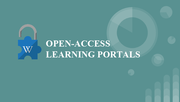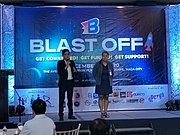Education/News/January 2021/The Possibility of Open-Access Learning Portals in the Philippines
The Possibility of Open-Access Learning Portals in the Philippines
Author: Anthony B. Diaz
Social Media channels or hashtags:
Blast Off - Naga City Startup Challenge
Summary: Open-Access Learning Portal, a project of having an offline Wikipedia in local learning hubs on remote areas was presented during the BLAST OFF, Naga City's first-ever digital startup challenge in the Philippines. Presenters are two active Wikipedians who both worked on online and offline outreach activities of Wikipedia.
The Open-Access Learning Portal is one of the presented projects for the pitching session of BLAST OFF, Naga City's first-ever digital startup challenge last December 14, 2020. The startup aims to promote innovative technologies that have the objective of improving not only the quality of industry in the city but of education as well. It also provides partnership programs where the City Government of Naga and the Naga City Investment Board (NCIB) could provide support and logistics for this type of project. This year, the Naga City Digital Startup Challenge has 14 qualifiers. The Open-Access Learning Portal was pitched to the panelists by two local Wikimedians, namely Imelda R. Brazal, a school librarian who is part of the Wikimedia Education Team, and Julius D. Bulahan, who is active on incubator projects such as the Central Bikol Wiktionary. Both are part of Pagsirang Inc., an organization of writers and artists that also supports the Wikimedia projects. The idea of the project is to provide local servers with an offline version of Wikipedia (English, Tagalog, or Central Bikol) and will be available to users connected to the hotspot. This targets primarily to compensate the inadequate learning resources of the country, especially the Secondary Education (Junior and Senior High School), promote self-directed learning of students and out of school community, promote reading in every Nagueños, and preserve culture by encouraging local writers to add articles related to Naga and Bicol, or Philippine history and culture. The framework of the portal would be composed of available network or server where it can host the offline Wikipedia file, the data file, IT developer who will create the SQL needed for the interface, translators who will create a considerable number of articles in Central Bikol Language, and a pilot testing community who would run the project. The prospect for the pilot testing community is the remote areas where the data connection is almost below average or none in this case. The idea of maximizing the use of the free encyclopedia offline where it could cater to a high percentage of users was well received by the panelists and eventually discussed to be in partnership with the local learning hubs in the Bikol area.

